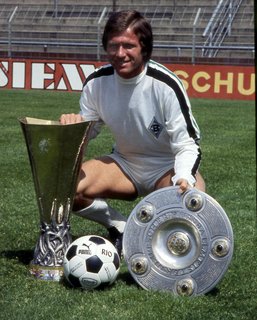Name: Josef Heynckes
Nickname: "Osram"
Country:

Germany
Club: Borussia Mönchengladbach
Position: *
CF,
SS,
WFSide: RF/BS
Age: 25-30 years (09/05/1945)
Height: 180 cm
Weight: 77 kg
Attack:
95Defence:
41Balance:
81Stamina:
82Top Speed:
85Acceleration:
90Response:
89Agility:
83Dribble Accuracy:
82Dribble Speed:
84Short Pass Accuracy:
78Short Pass Speed:
73Long Pass Accuracy:
76Long Pass Speed:
74Shot Accuracy:
94Shot Power:
82Shot Technique:
93Free Kick Accuracy:
71Curling:
78Header:
86Jump:
89Technique:
84Aggression:
92Mentality:
82Keeper Skills:
50Team Work:
77Injury Tolerance:
BCondition:
7Weak Foot Accuracy:
7Weak Foot Frequency:
5Consistency:
6Growth Type:
StandardCARDS:S01 Reaction
S03 1-on-1 Finish
S05 1-touch Play
SPECIAL ABILITIES: Positioning - Scoring - Reaction - 1on1 Scoring - 1 touch Pass
Attack / Defence Awareness Card: Attack Minded
INFO:Jupp Heynckes was one of the greatest ever German players. A stripped down style, constant mobility, great speed of execution characterized this perfect athlete. An introverted character in everyday life, he was also very generous on and off the pitch. He was very versatile player with great shooting abilities, technique, good speed and heading. He used to play as a classic centre forward or winger but often even as a deep lying forward who was coming frequently very deep to get the ball and start the attack. After Gerd Müller and Klaus Fischer the third highest-scoring goalgetter in Bundesliga history, Heynckes always had a desire and an urge to move infield as soon as he was in possession. He benefitted from Mönchengladbach’s flexible forward line in which Henning Jensen was the centre forward and Allan Simonsen the right wing only by name. But de facto the three forwards constantly interchanged positions. Heynckes, who was not very tall, could rise high in the air thanks to his extraordinary jumping power and scored many goals with headers, could shoot very well with both feet. In his last ever Bundesliga game he managed to score five goals. For Germany, Heynckes played a far more humble role. With Gerd Müller firmly occupying the centre forward spot, Heynckes found it hard to replicate his goal scoring ratio in club football, as playing for Germany he in fact had to play like a classic winger that had to service the centre forward. A role for which better suited players than Heynckes were available. After Müller’s retirement from the German national team in 1974, Heynckes got more playing time and became a regular starter for the national team but in his last three years as a professional he was constantly plagued by trouble with his knee which limited his playing time for club and country considerably. With Borussia he won in 1971, 1975, 1976 and 1977 four German championships, in 1973 the DFB Cup and 1975 UEFA Cup. Between 1970 and 1978 Jupp scored 168 goals in 226 Bundesliga games corresponding to an average of 0.74 goals per game. In 1974 and 1975 he was top scorer in both seasons with 30 and 27 goals, while in 1974 he shared the honor with Gerd Muller. After a total of 369 Bundesliga games, Jupp Heynckes retired in 1978 as player from the Bundesliga. In the Bundesliga with 195 goals he is scoring record of Borussia Moenchengladbach, the total number of 220 goals means third place in the eternal goal scorers in the Bundesliga behind Gerd Müller with 365 and Klaus Fischer with 268 goals. With 51 goals, he is also the fourth-top scorer in European club competitions. In his 64 games, he reached an average of 0.80 goals, which is surpassed by the top scorer Gerd Müller only by 0.89. In the history of the UEFA Cup is Heynckes, together with Dieter Müller, - both reached 29 goals - the third top scorer. For the German national football team, he won from 1967-1976 39 caps and scored 14 goals. With the national team in 1972, he won the European Championship in Belgium and in 1974 the world title on home soil.

 Germany
Germany